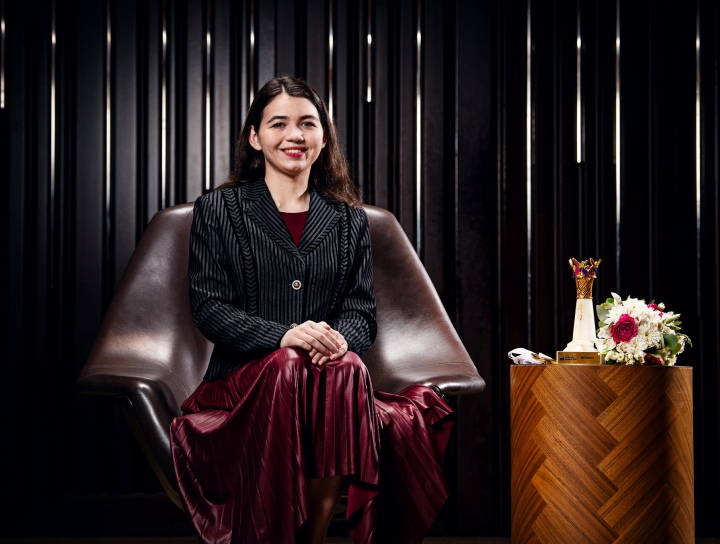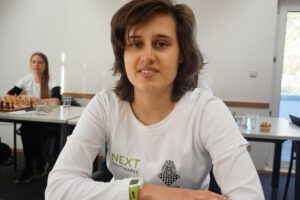
FIDE PR Officer Anna Volkova spoke with the 2023 FIDE Women’s World Cup winner soon after her triumph. You can watch the video version of the interview on our YouTube channel in Russian with English subtitles. Photos by Stev Bonhage.
– We are joined by Aleksandra Goryachkina, winner of the 2023 FIDE Women’s World Cup. Aleksandra, congratulations on this success. Your career has seen many tournament victories, including national championships and the Candidates Tournament. At the last World Cup, you took second place. How do you feel after this victory? How difficult was it?
– Thank you. Knockouts, in general, are never easy. The final was quite challenging. Until then I played smoothly and confidently. Then I became nervous because I hadn’t won the final yet, and this is where the problems started.
– You played the first three rounds confidently, without any tie-breaks: winning with White and making draws with Black. Tell us about this stage of the event; how confident did you feel, did you manage to catch the momentum, or were the opponents not so tough?
– Since I have a high rating, I played with lower-rated opponents and in the first three rounds, the opposition was not the strongest. I could have scored even more points, but I reached my main goal, and it was enough.

– If we talk about some turning points, the tie-break with Harika was quite long, tiring and tense. Was it the most difficult match of the tournament?
– The hardest match was probably the final. The match with Harika was also very difficult: she is quite a strong opponent, and she was very motivated. I already have my spot in the candidates; she wanted to get it, too. Perhaps, for her, it would have been better if she was paired with some other opponent. But these things happen. We played two fairly even draws in the classical games; I had almost no chance there. But in the tie-break, I won the first game with Black. I can’t say I deserved it because she dropped a piece in one move. But then I lost the second game unexpectedly with White; it was one-way traffic. She played an excellent game, of course. I decided to stabilise the situation a little bit, and we played two draws again. Then in blitz, I won the first game again with Black, and in the second game with White, I already knew the trick. I pulled myself together and survived.
– The final also seemed quite dramatic: not everything was going smoothly for you. Tell us about it.
– To be honest, I didn’t arrive at the final in the best condition. I had some health problems, which unsettled me a bit. All the games in the final were topsy-turvy. But I was lucky somehow. I’m glad I managed to achieve a good result.
– If we talk about your recent major victories – a win in the Grand Prix series and this tournament, and speaking about the formats of chess tournaments, where do you feel more comfortable, playing Swiss or knockout events?
– I didn’t win the whole Grand Prix series, just one stage, and I finished second to Lagno. Which format is better? Whichever you win, I guess.

– Who helped you at this tournament? Who supported you? We saw your father, and we saw some fans who came specifically to your games. Can you tell us about your support and its visibility and necessity at this kind of tournament?
– The support was purely moral – my dad and the fans. Of course, it was unexpected that they would cheer for me so much. Speaking of coaching, it was a challenge. Nobody helped me, and it is certainly not easy in knockout events.
– How do you manage to cope with physical fatigue in general? After all, the tournament lasted for almost a month, and your opponents are the strongest women chess players in the world.
– Perhaps, one should try to avoid playing tie-breaks because they take up a lot of energy. If you rest at those moments, you can recover, prepare a bit, sleep, and, in general, it goes easier afterwards. In one of my interviews, I have already mentioned that I try to imitate Alexandra Kosteniuk in knockouts; she won the knockout World Championship and the first World Cup. She won both without tie-breaks if I remember correctly. That’s what you call a top-level!
– A final question is about your plans. What tournaments are coming up for you? What goals do you set for yourself?
– I think I will play the Grand Swiss and the Rapid & Blitz World Championship at the end of the year. I will try to perform as well as I possibly can.
– Thank you very much. Congratulations again. New victories!
– Thank you.






More Stories
Chess in New York: A walk through parks, clubs and history
FIDE World Rapid and Blitz in New York preview: An epic ending to 2024
„Schach als Brücke für Frieden und Hoffnung“
Season’s greetings from FIDE President
Full list of participants for 2024 WRB announced
Gukesh D crowned 18th FIDE World Champion